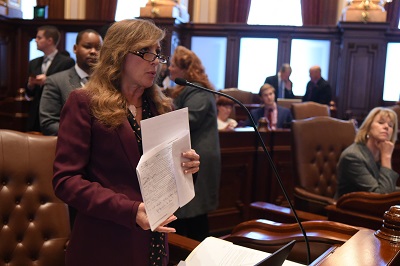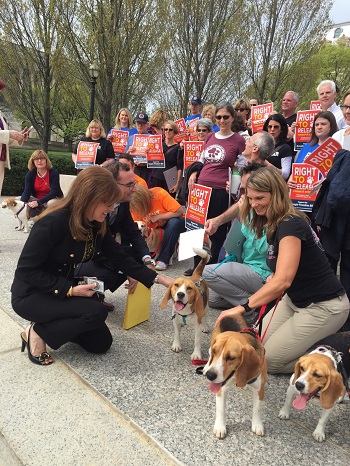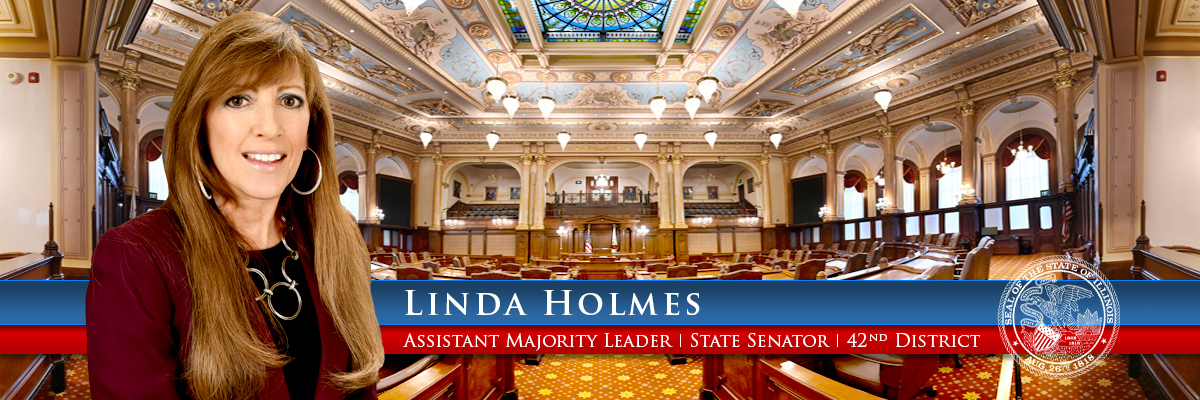- Details
- Category: Uncategorised
 SPRINGFIELD – Senator Linda Holmes (D-Aurora) moved legislation this week that would expand workers’ compensation for firefighters and EMTs to cover a potentially deadly, antibiotic-resistant staph infection that poses a particularly high risk to first responders.
SPRINGFIELD – Senator Linda Holmes (D-Aurora) moved legislation this week that would expand workers’ compensation for firefighters and EMTs to cover a potentially deadly, antibiotic-resistant staph infection that poses a particularly high risk to first responders.
House Bill 3662 would amend the Workers’ Compensation Act. It presumes that these professionals would be exposed to MRSA (Methicillin-resistant Staphylococcus aureus) in the course of their employment.
“The job of a firefighter or EMT includes administering up-close care to people who may be MRSA carriers or infected with MRSA,” Holmes said. “This puts first responders at increased risk for MRSA contamination—it’s common sense that a MRSA infection should be covered under workers’ compensation policies.”
The measure is an initiative of the Associated Fire Fighters of Illinois.
Current workers’ compensation coverage includes blood-borne pathogens, lung and respiratory diseases and conditions, heart and vascular diseases and conditions, hypertension, tuberculosis and cancer.
“MRSA is different from other staph bacteria because it has become resistant to most of the antibiotics doctors use to treat staph infections,” Holmes said. “It’s important we update our policies to make sure we’re protecting first responders from emerging threats to their health and safety.”
House Bill 3662 has now been approved by both the House and Senate.
- Details
- Category: Uncategorised
 SPRINGFIELD – The work of Senator Linda Holmes (D-Aurora) and an Electronic Notarization Task Force produced a report detailing the benefits for Illinoisans that was provided to the governor and General Assembly, and its findings led to a measure sponsored by Holmes and passed by the Illinois Senate.
SPRINGFIELD – The work of Senator Linda Holmes (D-Aurora) and an Electronic Notarization Task Force produced a report detailing the benefits for Illinoisans that was provided to the governor and General Assembly, and its findings led to a measure sponsored by Holmes and passed by the Illinois Senate.
Senate Bill 2664 will set the standards for appointment as an electronic notary, creates definitions for electronic notarization; codifies best practices of the National Association of Notaries for electronic notarization; and implements safeguards to ensure the integrity of the technology and the process of electronic notarization.
“I was convinced this was a step to update a process many people use but sometimes can’t find a notary nearby; over the past year, the need for a convenient, protected method for notarization for businesses and consumers became even more obvious,” Holmes said. “I’m pleased that Speaker Chris Welch has picked up this bill as chief sponsor in the House.”

- Details
- Category: Uncategorised
SPRINGFIELD – First-time entrepreneurs will be able to save money on state licenses and permits under a new pilot program. The entrepreneur learner’s permit program was introduced and sponsored in the Illinois Senate by State Sen. Linda Holmes, D-Aurora.
“Entrepreneurs take on a lot of risk when they start new businesses. This risk taking is what ultimately moves the economy forward,” Holmes said. “Any time we in state government can encourage people to start businesses and create jobs, we should do so with fiscally responsible and thoughtful legislation.”
The Senate recently voted to override Gov. Bruce Rauner’s changes to the entrepreneur learner’s permit pilot program. The original version of the legislation minimizes spending by creating a pilot program to subsidize first-time entrepreneurs in information services, biotechnology and green technology with a state spending cap of $500,000.
The governor used his veto power to remove the spending cap and expand the pilot program to include all industries. Holmes says that the governor’s amendatory veto turns a smart business development measure into a potentially wasteful program.
“The governor’s changes would direct an unknown sum of taxpayer dollars into a pilot program that may still need improvements,” Holmes said. “This is a surprising and confusing decision by Governor Rauner, who has presented himself as a fiscally responsible reformer. We were able to return to a much more limited, fiscally responsible version of this pilot program that can be expanded if it is successful.”
The entrepreneur learner’s permit would encourage small business growth by reimbursing first-time business owners for certain costs paid to the state for licensing and permits. The Illinois legislation is a pilot version of a similar program established by the Connecticut State Legislature in 2016.
After veto override votes in the Illinois Senate and House of Representatives, Senate Bill 1462 is now law. It will take effect immediately.
###

- Details
- Category: Uncategorised
SPRINGFIELD — Legislation to improve the adoption process for research dogs and cats has been signed into law. State Sen. Linda Holmes, D-Aurora, introduced the legislation, which would require public research institutions in Illinois to have an adoption policy in place for dogs and cats used in testing rather than euthanizing them immediately.
“Last General Assembly, the ‘Beagle Freedom Bill’ sparked an important debate around the humane treatment of scientific research animals,” Holmes said. “We went back to fix a few problems with the bill to bring it back this year. The new law reflects all of that work, ensuring that an animal is given a chance at a life outside of a laboratory without overregulating scientific research.”
The new law requires publicly-funded institutions to have an adoption plan for animals deemed eligible by a veterinarian before euthanasia is an option. It does not force research institutions to find a home for each animal, nor does it ban euthanasia outright.
The legislation is part of a nationwide initiative led by the Beagle Freedom Project, so named because dogs of that breed are commonly used in scientific research. The legislation applies to cats used in research as well. Similar legislation has already been passed in California, New York, Minnesota, Connecticut and Nevada.
The measure, Senate Bill 1884 was signed into law by Gov. Bruce Rauner today. It takes effect immediately.
More Articles …
Page 1 of 3




